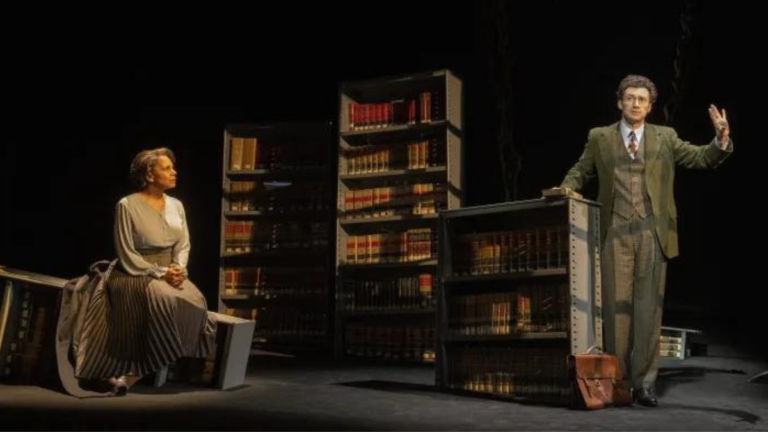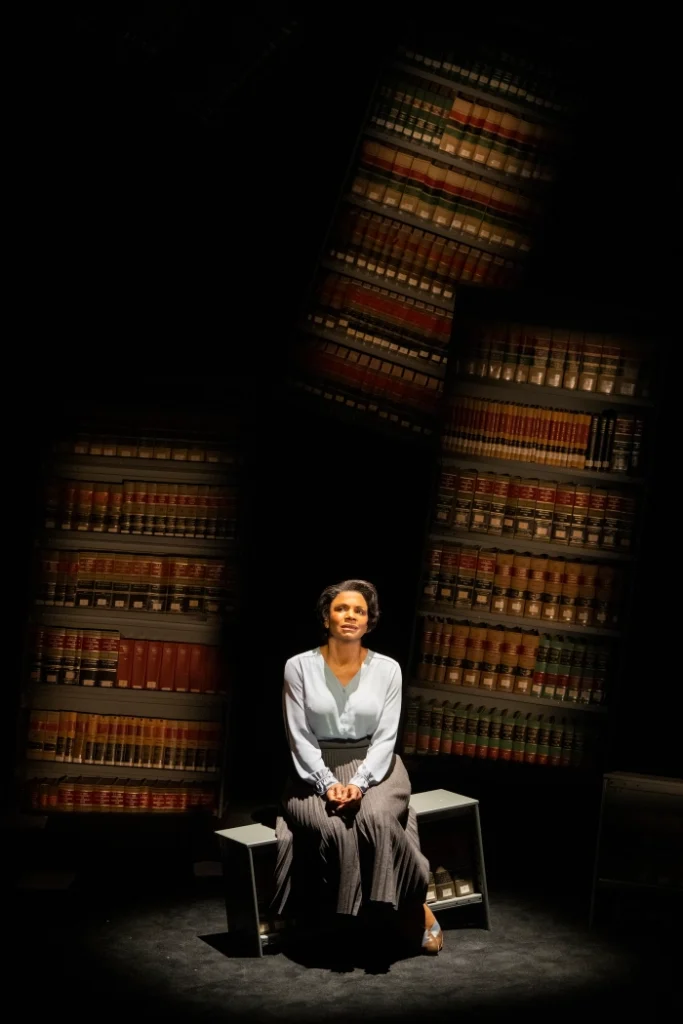
The drama, which starred Audra McDonald, was Adrienne Kennedy’s far-too-late Broadway debut.
By Soraya Nadia McDonald
Suzanne Alexander, like the lady who made her, has been waiting to be heard for what seems like an eternity. Alexander, the central figure in Ohio State Murders, is the creation of 91-year-old writer Adrienne Kennedy. Kennedy, a titan of the African-American theatrical canon, made her Broadway premiere with this performance in December.
When we meet Suzanne, she is delivering a lecture at her college school, decades after the institution did everything it could to keep the many ways it failed her hidden. Suzanne, played by Audra McDonald, is a writer who likes to experiment with topics, personalities, and imagination. Suzanne has been asked to explain why her iconography is frequently brutal. In doing so, she transports us to the 1949 Ohio State campus, where a few Black students dot the otherwise buttermilk population of the university, and where Negro students, as they were called back then, must pass a contrived set of obstacles to be eligible for admission to the English department.
Suzanne soon dazzles her lecturer with her word magic and insights into Thomas Hardy, and this is the start of a disaster she’s too young and naïve to see coming. Suzanne is portrayed by McDonald as both a youthful college student and a successful writer making an academic homecoming. (Ruby Dee had the role when the play premiered at the Great Lakes Theater Festival in 1992.) She gives Suzanne a high-pitched feminine lilt before telling the tale of her life at Ohio State with formal matter-of-factness. Though the show will end early on January 15, I don’t want to ruin its jaw-dropping revelation.
The play is much more than that, as evidenced by the numerous barrister bookcases that fill the stage, created by Beowulf Borritt. A chasm rises beyond the bookshelves, frigid and quiet, dotted with snowfall.

Ohio State Murders is 75 minutes long, but it is not a fast watch. Kenny Leon directs this production with simplicity and reserve, fusing Kennedy’s and Suzanne’s voices. Before the opening curtain, audio of Kennedy being interviewed permeates the house until Suzanne arrives, and McDonald’s controlled elocution weaves a mystique throughout. Where do Kennedy and Suzanne meet? Kennedy, like her author heroine, went to Ohio State. And her portrait of Suzanne’s life, choices, and thinking is so comprehensive that one wonders if the play is autofiction, a blurriness that Leon’s direction promotes.
The opening and closure of Ohio State Murders on Broadway, like the staging of Alice Childress’ Trouble in Mind, came far too late. After producers nixed it in 1955 because Childress refused to make it less offensive to white people, Childress’ Trouble in Mind eventually had its time in 2021. And this was in the first half of a season when Broadway was stumbling back from the coronavirus pandemic’s mandated closures, a season planned after the pressure cooker summer of 2020, when many white people briefly opened their eyes to the realities of Black American life and their less-than-flattering roles in it.
Commercial theatre in New York has yet to recover from the pandemic’s devastation, and off-Broadway is faring little better. See: KPOP and Ain’t No Mo’s blink-and-you-miss-it dashes. But the premature closure of Ohio State Murders is more difficult for me to accept, both as a professional witnessing the underappreciation of two of the greatest living American theatre artists and as a Black woman frustrated by a lack of appetite for Black artistic truth that is quiet and haunting, rather than high-octane razzmatazz.
It’s not an unreasonable wish—after all, audiences rushed to see Mary-Louise Parker in The Sound Inside, which, like Ohio State Murders, centers on a female scholar at the center of a quiet investigation that draws viewers into its slow-moving but eventually devastating developments.
The Cort Theater, which holds Ohio State Murders, was recently renamed after James Earl Jones, who made his Broadway début there in 1958. The first production under the new moniker was Ohio State Murders. The Lena Horne Theatre, which was previously called after theatre reviewer Brooks Atkinson, was also changed after the late actress and vocalist in 2022. Both joined the August Wilson Theater, which was given that name in 2005. These steps are unquestionably good and long overdue.
However, I hope the proprietors of Broadway companies recognise the environment they helped to establish, one in which no Black woman has received a Tony for playwriting despite an abundance of good material, including works by Kennedy and Childress. They’ve conditioned audiences to see Black women as fiery and ferocious, high priestesses with soaring voices and invincible stage presence. Suzanne Alexander’s sensitive, vulnerable interiority endured only five weeks. Her nonagenarian forefather, on the other hand, continues to write. Kennedy’s dedication, elegance, and confidence in her craft, in her worth, in her sharp, poignant, and unsettling ideas is its own kind of unabated phantom light. The route may be hazy, but there’s a spot for us somewhere on Broadway.
Andscape’s chief culture reporter is Soraya Nadia McDonald. She covers topics such as contemporary culture, fashion, the arts, and books. She won the George Jean Nathan award for dramatic criticism in 2020, was a candidate for the Pulitzer award in criticism in 2020, and finished second in the 2019 Vernon Jarrett Medal for excellent reporting on Black life.